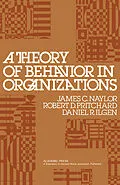A Theory of Behavior in Organizations develops a theory for organizational behavior, or, more accurately, a theory of individual behavior within organizations of behavior.
The book begins by discussing a series of general issues involved in the theory of behavior in organizations. It then describes the theory itself in three stages: first, the general structure of the theory; second, definition of the key variables; and third, the interrelationships between the variables. Subsequent chapters show how the theory deals specifically with such issues as roles, decision making, and motivation.
The theory presented is a cognitive theory of behavior. It assumes that man is rational (or at least nonrandom) for the most part, and that as a systematic or nonrandom generator of behavior, man's actions are explained best in terms of conscious, thinking acts on the part of the individual. The theory deals with why the individual chooses certain alternative courses of action in preference to others, and thus it might properly be called a theory of choice behavior. Whereas the emphasis is on the cognitive aspects of behavior, considerable attention has been devoted to external, noncognitive variables in the system that play meaningful roles in the determination of individual behavior.
Inhalt
Preface
1. A Viewpoint Concerning Organizational Behavior
Defining Behavior
Behavior versus Products
The Role of the Environment
Individual Differences
The Perceptual Process
The Motivational Process
The Learning Process and the Role of Memory
Affect
2. The Theory
Definitions of Symbols Used in Theory
Key States and Variables in the Theory
Individual Differences
Interrelationships between the Variables: the Causal Sources of Influence
3. Judgment
The Judgmental Process
Judgment Systems
Criterion Systems
The Judgment Space
Summary
4. The Role of Judgment within the Theory
Initial Perceptions
Contingency Perceptions
Evaluation Perceptions
The Comparison Process
Affective Cognitions
Utility of Products
Utility of Acts
Some Commentary on Judgment and the Behavior of Individuals
Real versus Theoretical Judgment Processes-the Degraded System
Types of Heuristics
Concluding Comments
5. Roles and Role Behaviors
A Definition of Roles
The Role Process in the Theory
Role Compliance
Role Conflict
Role Ambiguity
Role Negotiation
Concluding Remarks
6. Motivation
Defining Motivation
The Motivation Process
Intrinsic and Extrinsic Motivation
Phenomenological Simplification of the Motivation Process
7. Leadership: A Major Factor of the Social Environment
Environments
Leadership
Leadership within the Theory
Other Leadership Theories and Models
Conclusion: A Perspective on Leadership
8. Organizational Climate
True Attributes versus Perceived Attributes
Climate as a Judgmental Process
A Schematic Representation of Climate
Shared Climate Perceptions: What are They?
Is Organizational Climate a Useful Construct?
The Relationship of Climate to Behavior
9. Some Concluding Comments
References
Glossary
Index
